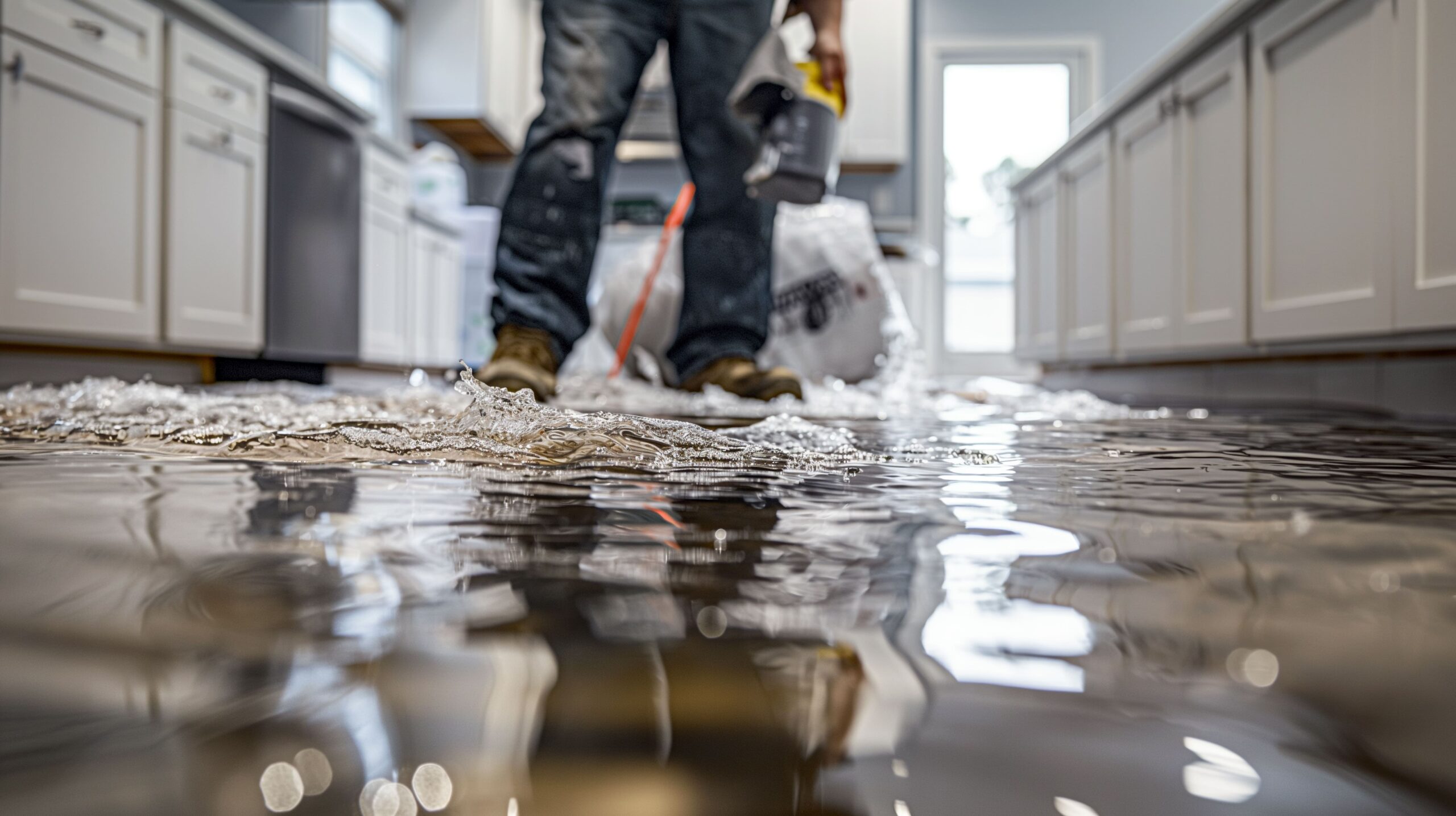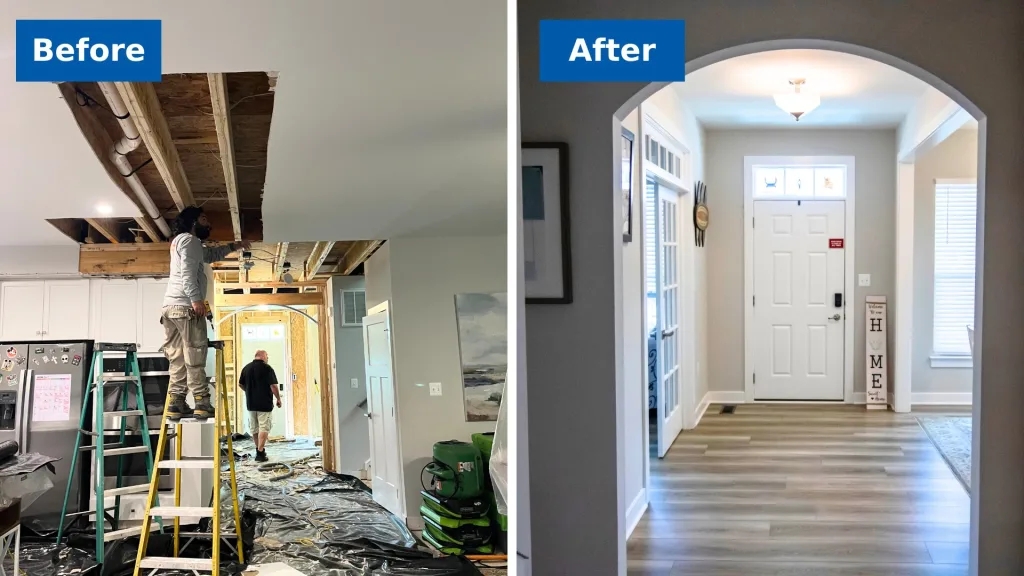DIY vs. Professional: When to Call Experts for Water Damage Cleanup
DIY vs. Professional: When to Call Experts for Water Damage Cleanup
Blog Article
The Full Guide to Navigating the Difficulties of Water Damage Repair
Water damage can strike suddenly, leaving you with a daunting mess to cleanse up. Recognizing the causes and evaluating the degree of the damages is important. Your immediate activities can make a considerable distinction in the result. What actions should you take first, and exactly how can you ensure you're safeguarded moving ahead? The responses depend on a comprehensive strategy to repair that every house owner ought to understand.

Comprehending the Root Causes Of Water Damages
Water damages can strike unexpectedly, usually leaving you clambering to resolve the results. Comprehending the reasons of water damages is essential for avoidance. Flood Damage Restoration. Typical offenders include leaking roofs, ruptured pipes, or malfunctioning home appliances. You could likewise experience concerns with your plumbing systems, like clogged drains pipes or sewage back-ups, which can result in considerable water breach. Weather-related occurrences, such as hefty rains or flooding, can also ruin your property. Additionally, the age of your home plays a function; older structures usually have deteriorating materials that are much more susceptible to leakages and damages. Even small issues, like condensation from HVAC systems, can collect and trigger issues over time. By recognizing these prospective resources of water damage, you can take proactive procedures to guard your home and decrease future risks. Remaining notified will equip you to acknowledge very early indicators and act quickly when troubles emerge
Analyzing the Level of the Damage
Once you have actually determined a possible water damage concern, reviewing the extent of the damages is necessary for determining the ideal response. Begin by examining the affected areas extensively. Look for visible indications like water spots, distorted floorings, or peeling paint. Do not neglect to inspect covert places, such as behind walls or under carpetings, where wetness may linger.Next, identified the sort of water entailed-- clean, grey, or black-- considering that this affects the seriousness of the damage and required removal steps. Use a moisture meter to determine humidity degrees in wall surfaces and floors, helping you determine remaining dampness that might lead to mold growth.Document every little thing with images and notes, as this details can be crucial for insurance claims. By accurately assessing the damages, you'll be much better geared up to pick the appropriate repair technique and stop further problems down the line.
Immediate Tips to Take After Water Damage
After experiencing water damages, the initial thing you need to do is evaluate the situation very carefully. Prioritizing your security is vital, so see to it the area is risk-free before taking any kind of further steps. Do not neglect to document every little thing thoroughly, as this will certainly be essential for insurance policy cases and repair efforts.
Evaluate the Damage
Evaluating the damages swiftly is essential for decreasing the influence of water breach. Start by evaluating the impacted areas to establish the level of the water damage - Water Damage Cleanup. Search for visible signs like drenched carpetings, deformed floorings, and tarnished wall surfaces. Examine for surprise water, as well, specifically in crawl spaces and behind home appliances. Utilize a wetness meter if you have one, as it can help pinpoint locations that require attention. Paper whatever with notes and pictures; this will serve for insurance policy cases. Keep in mind to examine your belongings as well-- furnishings and individual products may need professional cleansing or disposal. By comprehending the extent of the damages, you can make educated choices concerning the following steps in the restoration procedure
Focus On Safety And Security First
Recognizing the extent of water damages is simply the start; your safety and security comes. Prior to you go into a water-damaged area, make sure to transform off the electrical power and gas supply to avoid any type of risks. Put on safety equipment, consisting of handwear covers and boots, to secure yourself from impurities. Be mindful of architectural instability-- floorings, ceilings, or wall surfaces may have deteriorated. Stay clear of call and call experts for assistance if the water is coming from a sewage source. Maintain pet dogs and children away from the affected area. Leave promptly if you smell gas or see electric triggers. Remember, prioritizing your safety warranties you can properly resolve the damages without danger to your health. Always err on the side of caution.
Record Whatever Thoroughly
As you begin attending to water damages, recording every little thing completely is crucial for both insurance policy claims and restoration efforts. Begin by taking clear photos of the impacted locations, recording the degree of the damages. Make sure to note the date and time of the incident. Develop a checklist of harmed products, including furniture, home appliances, and individual items, together with their approximated worths. Record any type of activities you take, like speaking to experts or moving things to avoid additional damages. Maintain all invoices and receipts associated with the reconstruction procedure. When filing a claim and assist the reconstruction group understand the circumstance better, this documents will strengthen your situation (Flood Damage Restoration). Bear in mind, complete documentation can make a considerable difference in your recovery journey

Protecting Against and alleviating further concerns Mold and mildew Development
When water damage takes place, acting rapidly can significantly reduce the risk of more issues, particularly mold and mildew development. First, remove any kind of standing water using pumps or wet vacuums. Next off, dry the influenced areas extensively. Open home windows, make use of fans, and think about dehumidifiers to expedite the drying procedure. Go for a humidity level below 60% to prevent mold and mildew spores from settling.Inspect all materials and surface areas impacted by water; dispose of anything that can't be adequately dried out, like soaked carpetings or drywall. Clean and sanitize continuing to be surfaces with a blend of water and detergent, or a specialized mold-preventive solution.Keep an eye on the location over the following few weeks. Address it quickly if you discover any type of mildewy scents or discoloration. Bear in mind, punctual activity not just avoids mold and mildew growth however likewise safeguards your property and wellness.
Dealing With Water Damage Reconstruction Experts
After taking instant actions to mitigate water damage and protect against mold development, it's time to ponder specialist assistance. Water damage restoration experts have the proficiency and equipment needed to deal with considerable damages effectively. Be ready to describe the scenario in detail when you get to out. This aids them assess the intensity of the damage and prepare accordingly.Once they show up, expect an extensive examination and an in-depth plan for reconstruction. They'll use specific devices to remove water, dry out influenced locations, and sterilize your area. Don't hesitate to ask questions during the procedure; comprehending their methods can alleviate your concerns.You must likewise talk about timelines and what to anticipate at each phase of the remediation. Working together openly with these experts warranties you stay notified and entailed, assisting you regain your room more successfully. Depend on their expertise, and you'll see your home return to its pre-damage condition.
Browsing Insurance Cases for Water Damage
Steering insurance policy claims for water damages can feel frustrating, particularly if you're unfamiliar with the procedure. First, assess your insurance plan to understand what's covered. Seek specifics on water damage, as not all plans treat it the exact same. Document the damage thoroughly-- take pictures and make notes regarding what happened and when.Next, call your insurance copyright without delay. Report the damages and give them with your paperwork. They'll assign an insurance adjuster to analyze the scenario. Be prepared to address inquiries and offer additional information as needed.Stay arranged throughout the procedure. Maintain a record of all interactions, including days, names, and information of discussions. If your case is refuted or you feel it's inadequate, don't wait to appeal. Know that persistence can pay off, so supporter on your own to assure you receive the protection you're entitled to.
Tips for Future Water Damage Avoidance
To keep your home safe from water damages, routine maintenance checks are crucial. Don't overlook the worth of mounting water detection systems, as they can notify you to leakages prior to they end up being major problems. By remaining positive, you can save on your own time, money, and stress and anxiety in the future.
Regular Maintenance Checks
While it might seem tiresome, performing regular maintenance checks can greatly lower the danger of future water damages in your house. Beginning by checking your roofing system for missing out on tiles or leaks; also tiny problems can rise swiftly. Examine seamless gutters and downspouts to guarantee they're clear and routing water far from your foundation. Search for indicators of dampness in basements or crawl areas, and attend to any kind of leaks from pipelines or home appliances immediately. Bear in mind to check your sump pump consistently to verify it's operating correctly. Do not ignore your washing device tubes; change them every couple of years to stop burst catastrophes. By staying proactive with these checks, you'll conserve on your own time, money, and stress and anxiety in the lengthy run.
Set Up Water Detection Systems

Often Asked Concerns
For how long Does the Water Damages Restoration Refine Usually Take?
The water damages remediation process typically takes anywhere from a few days to numerous weeks, depending upon the extent of the damage. You'll wish to act promptly to minimize more issues and speed up the process.
Can I Remain In My Home During the Remediation Refine?
You can remain in your home throughout the restoration procedure, but it depends upon the degree of the damages. If it's serious, more info it's much safer to briefly relocate till the work's finished and your home's safe.
What Personal Things Can Be Salvaged After Water Damages?
After water damage, you can usually restore items like garments, publications, and electronics, offered they're not soaked or moldy. Constantly analyze their problem promptly and consult experts for advice on reconstruction and security.
Exist Any Type Of DIY Approaches for Bring Back Water-Damaged Products?
Yes, you can use DIY approaches to recover water-damaged items. For furnishings, air-dry and apply a timber conditioner. For fabrics, clean them thoroughly and air-dry. Constantly check for mold and mildew before trying any type of repair.
Exactly How Can I Recognize Hidden Water Damage in My Home?
To recognize covert water damages, check for water stains on wall surfaces and ceilings, listen for trickling audios, feel for moisture in materials, and take a look at locations near plumbing for indicators of mold and mildew or mold development. Once you have actually identified a possible water damages problem, evaluating the extent of the damage is crucial for identifying the ideal feedback. As you begin attending to water damage, recording whatever completely is important for both insurance policy cases and remediation efforts. Water damages restoration specialists have the competence and devices required to deal with considerable damages effectively. Installing water detection systems can be a game-changer for stopping future water damages in your home. The water damages remediation procedure usually takes anywhere from a couple of days to numerous weeks, depending on the extent of the damage.
Report this page